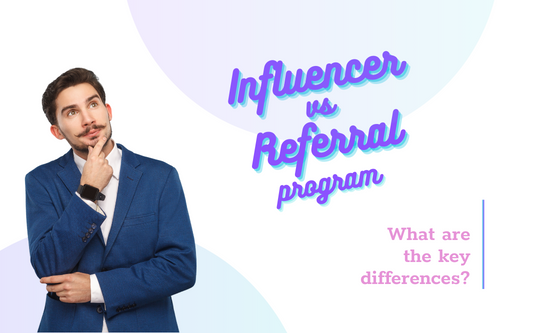Influencer vs Referral programs: When to apply?
 Apr 09th, 2024
Apr 09th, 2024
 483 views
4 MINS READ
483 views
4 MINS READ
Explore referral and influencer programs, the two most effective programs in this era. Learn when each strategy is most effective for your business.

Referral programs and influencer marketing are the two popular strategies that have gained significant traction in recent years. Both have proven to be effective in driving customer acquisition and increasing brand awareness, but understanding these programs and knowing when to apply each strategy can make all the difference in achieving optimal results.
Referral programs are a time-tested marketing technique that leverages the power of word-of-mouth marketing. Essentially, they incentivize existing customers to refer friends, family, or colleagues to the business in exchange for rewards or discounts. On the other hand, influencer marketing involves collaborating with individuals who have a strong online presence and a dedicated following to promote products or services to their audience.
So, when should businesses apply a referral program versus an influencer marketing strategy?
When to Apply Each Strategy to Your Business?
Typically, referral programs are ideal for businesses looking to capitalize on existing customer relationships and foster long-term loyalty. They work best for products or services that inspire passion or evoke strong emotions, as satisfied customers are more likely to recommend them to others. Additionally, referral programs are well-suited for businesses operating on a limited budget, as they rely on incentivizing existing customers rather than paying external partners.
On the other hand, influencer marketing is a powerful tool for reaching new audiences and increasing brand awareness. It is particularly effective for products or services that lend themselves well to visual or experiential promotion, such as fashion, beauty, or lifestyle brands. However, businesses must be prepared to invest significant resources in identifying, vetting, and partnering with the right influencers to ensure a successful campaign.
What are the key factors for deciding a suitable program?

Determining when to apply referral programs versus influencer programs to your business depends on several factors, including your target audience, marketing objectives, and resources. Here are some considerations to help you decide:
1. Audience Reach and Engagement
If your target audience is highly active on social media and influenced by online personalities, investing in influencer marketing may yield significant results. Conversely, if your audience is more receptive to recommendations from friends and family, a referral program may be more effective in driving conversions.
2. Brand Awareness vs. Conversion Goals
If your primary goal is to increase brand awareness and reach a broader audience, influencer marketing can be highly effective. On the other hand, if you aim to boost conversions and drive sales, a referral program may be more suitable, as it leverages existing customer relationships to generate leads.
3. Budget and Resources
Influencer marketing campaigns often require a significant investment, particularly when collaborating with macro or celebrity influencers. If your budget is limited, starting with a referral program can be a cost-effective way to generate leads and acquire new customers.
4. Long-Term Strategy vs. Immediate Impact
Referral programs are inherently designed to foster long-term relationships with customers, leading to sustained growth and loyalty. Conversely, influencer marketing campaigns may deliver more immediate results in terms of brand exposure and engagement but may not always translate into long-term customer relationships.
5. Product types: value vs visual
Referral programs work well for products or services with a high level of customer satisfaction and a strong value proposition. When customers are genuinely happy with their experience, they’re more likely to recommend the business to others. Referral programs are particularly effective for industries such as e-commerce, subscription services, and SaaS, where customer loyalty plays a significant role.
Otherwise, influencer marketing can be effective for a wide range of products and services, but it tends to excel in industries with a strong visual or experiential component. Fashion, beauty, travel, and food are just a few examples of industries where influencer marketing can create a significant impact. By showcasing products or services in authentic and relatable ways, influencers can generate excitement and drive purchase intent among their followers.
6. Stage of Business
Referral programs are particularly effective for businesses in the early stages of growth. When a company is just starting out, it may not have the resources to invest in large-scale marketing campaigns. Referral programs offer a cost-effective way to acquire new customers by harnessing the power of existing relationships. Additionally, referrals tend to result in high-quality leads as they come from trusted sources.
Influencer marketing is better suited for businesses that have already established a solid foundation and are looking to scale their operations. Collaborating with influencers can help reach a broader audience and increase brand visibility. However, influencer marketing often requires a higher investment compared to referral programs, so it’s essential to have a sufficient marketing budget in place.
Conclusion
In conclusion, both referral programs and influencer programs are valuable marketing strategies that can help businesses expand their reach, acquire new customers, and drive conversions. By understanding the differences between these two approaches and evaluating key factors, you can integrate them into your marketing efforts to achieve optimal results. However, developing and implementing these programs is a complex process, utilizing digital reward program platforms could simplify your tasks, easily track program performance, and enhance user experiences. Try ezLoyalty to easily manage your program!
 Back to blog page
Back to blog page
































